2017 Research Symposium
Graduate students showcase their work at 2017 Research Symposium
Graduate students and residents at the Virginia-Maryland College of Veterinary Medicine presented their research findings at the 28th Annual Research Symposium on Thursday, March 16. The event showcased graduate student contributions to the college's robust research program, which focuses on One Health to address both animal and human health, with signature programs in the areas of infectious diseases, immune and inflammatory responses, brain cancer, and regenerative medicine.
Master’s and Ph.D. students in the college’s Biomedical and Veterinary Sciences program provided oral and poster presentations. Graduate students from the University of Maryland’s Department of Veterinary Sciences also participated in the symposium.
A panel of faculty judges selected the top oral presentations and posters in both masters and Ph.D. student categories, and winners received prizes at an evening awards banquet held at the Inn at Virginia Tech. A faculty member and staff member were also recognized at the banquet with the Zoetis Award for Veterinary Research Excellence and the Outstanding Co-Worker Recognition Award.

Keynote Speakers
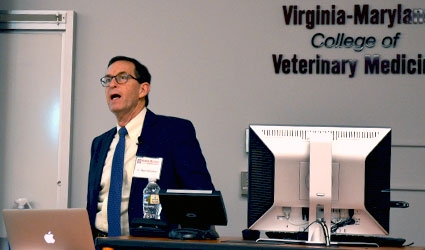
R. Mark Simpson, senior scientist in the Laboratory of Cancer Biology and Genetics at the National Cancer Institute’s Center for Cancer Research, presented the morning keynote titled "One health translational research in comparative oncology: A model for clinician scientists." Simpson is also an adjunct graduate professor or clinical professor at four colleges of veterinary medicine, and serves as an elected board member and is immediate past president of the Executive Council of the American College of Veterinary Pathologists. He is the founding director of the NIH Comparative Biomedical Scientist Training Program, an initiative to provide interdisciplinary training for veterinarians, in both diagnostic pathology and human disease-oriented medical research, to increase the synergy for comparative biomedical research interactions.
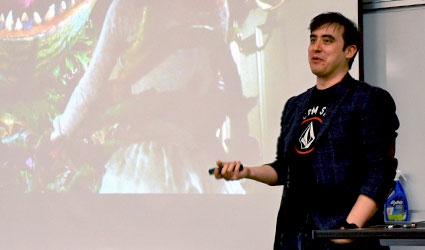
Award winning scientist, professor, entrepreneur, TED Fellow, and TED speaker Andrew Pelling presented the afternoon keynote titled "Augmented Biology: A New Frontier Inspired by Cheesy Sci-Fi Movies." Pelling, a professor and Canada Research Chair at the University of Ottawa, founded and directs a curiosity-driven research lab at brings together artists, scientists, social scientists, and engineers. The lab uses low-cost, open source materials and methods to explore speculative living technologies of the future. Most recently, Pelling co-founded and directs pHacktory, a distributed street-level research lab that amplifies community ideas through a potent mixture of craft, serendipity, and curiosity.
Outstanding Master’s Student Poster Award
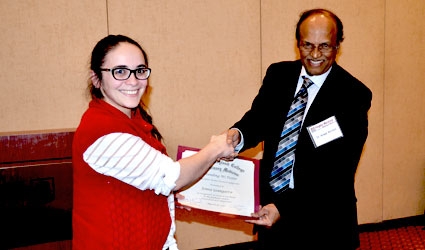
Jenna Giangarra of Omaha, Nebraska won the Outstanding Master’s Student Poster Award. Giangarra earned bachelor’s degrees in animal science with honors and in veterinary and biomedical science with honors from the University of Nebraska in 2008. She received her DVM from Kansas State University College of Veterinary Medicine in 2013. Under the direction of Sabrina Barry, assistant professor of clinical and small animal surgery in the Department of Small Animal Clinical Sciences, Giangarra studies the response of an inflammatory marker following injection of medication into canine joints. “The safe use of bupivacaine has been challenged within the human medical field due to reports of cartilage damage following continuous infusions. This has never been documented in the veterinary species and bupivacaine is an inexpensive, widely accessible and easily administered medication in the perioperative period for pain control,” explained Giangarra.
Outstanding Ph.D. Poster Awards
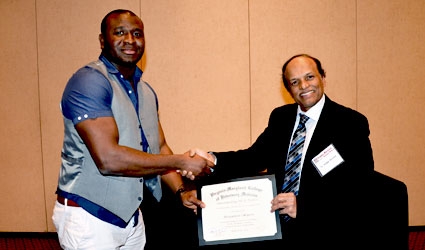
Ben Okyere of Ghana won the Outstanding Ph.D. Poster Award. Okyere, who earned a master’s degree in biomedical science from Virginia Tech, investigates neurological diseases with Michelle Theus, assistant professor of molecular and cellular neurobiology in the Department of Biomedical Sciences and Pathobiology. “My research study is on ischemic stroke, a disease caused by occlusion of a brain artery and its consequent reduction of blood flow to part of the brain. Our goal is to find therapeutic targets aimed at ameliorating the neurological deficits after stroke. Precisely, I am interested in vascular remodeling (arteriogenesis) mechanisms that enhance blood flow restoration after stroke,” said Okyere.
His research is especially significant because it translates directly to human medicine. “Stroke is estimated as the fifth leading cause of death and number one leading cause of morbidity in U.S. adults. Ischemic stroke occurs in 87 percent of stroke cases but the only FDA approved drug effectively treats about 4 to 7 percent of this ailing population. Thus, there is a grave need to find novel therapeutic targets to combat ischemic stroke,” he explained. Okyere has also been recognized as Best Ph.D. Student at the 3rd Annual Mid-Atlantic PREP/IMSD Research Symposium (MAPRS), was awarded second place in the Virginia Tech Graduate Student Assembly Symposium, and was recently awarded the Ruth L. Kirschstein Predoctoral Individual National Research Service (F31) Award by NIH.
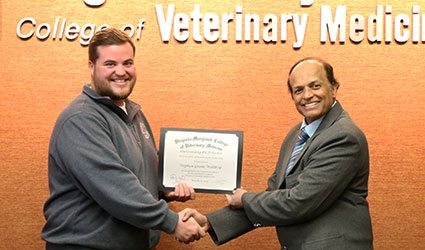
Grant Waldrop of Greenville, South Carolina, who also received the Outstanding Ph.D. Poster Award, earned his bachelor’s degree from Ferrum College and is currently enrolled in the college’s DVM/Ph.D. dual degree program. He works with Nammalwar Sriranganathan, professor of veterinary microbiology in the Department of Biomedical Sciences and Pathobiology, on developing a dual vaccine to protect against brucellosis and immunocontraception. Waldrop, who also received a second-place award for his poster at the 2016 International Brucellosis Conference in New Delhi, India, explained that “the vaccine has a great potential for wildlife management applications along with use in domestic food animal management.” Waldrop credits the opportunities he has received at the veterinary school for his success. “I have a special opportunity to combine my love for microbiology research and the medical field through the dual degree program, which gives me the opportunity to not only practice small animal medicine but advance the medical field in the pursuit of knowledge.”
Outstanding Master’s Student Presentation Awards
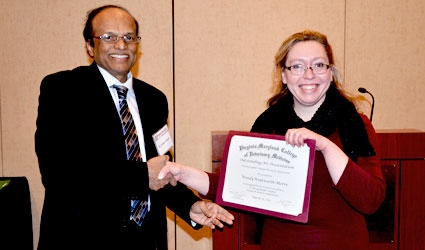
Wendy Wentworth-Morre of Skowhegan, Maine won the Outstanding Master’s Student Presentation Award. Wentworth-Morre earned an associate’s degree in business management/marketing from Kennebec Valley College before receiving a bachelor’s degree in animal science from Murray State University and her DVM from Iowa State University. She is currently completing both a small animal internal medicine residency and master’s degree in biomedical and veterinary sciences concurrently. Wentworth-Morre studies radioactive iodine dosages as a treatment for cats with hyperthyroidism with David Panciera, the Anne Hunter Professor of Veterinary Medicine and professor of internal medicine in the Department of Small Animal Clinical Sciences. “I really enjoy working with these cats and their owners who love them. It is rewarding to be able to treat these cats and make them feel a lot better in a very short period of time with just one procedure,” she said.
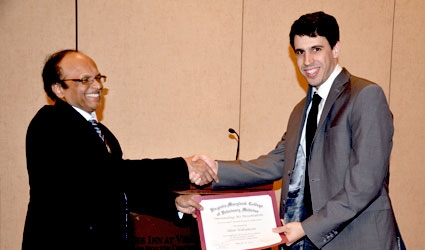
Allan Williamson of Ontario, Canada, who also received the Outstanding Master’s Student Presentation Award, earned his bachelor’s degree with honors from McMaster University and his DVM from Ontario Veterinary College. Working with João Soares, assistant professor of anesthesiology in the Department of Small Animal Clinical Sciences, Williamson studies the ability of an analgesic drug, fentanyl, to help maintain blood pressure and heart function under anesthesia in dogs. “This is research that has significant clinical applications. We often use high doses of fentanyl and related drugs in very sick animals in the thought that it will help improve blood pressure and heart function. It allows us to see just how much those change and justify whether or not it's warranted to use such high doses,” he explained. Williamson, who also recently presented his research at the meeting of the European Association of Veterinary Anesthetists, ultimately wants to “help make anesthesia safer for the patients who are at the highest risk from it.”
Outstanding Ph.D. Student Presentation Awards
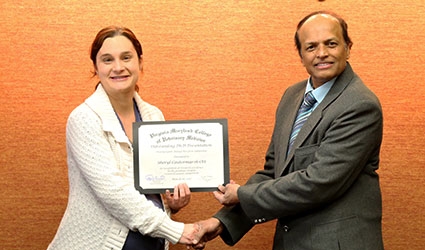
Sheryl Coutermarsh-Ott of Thurmont, Maryland received the Outstanding Ph.D. Presentation Award. Coutermarsh-Ott earned her bachelor’s degree from the University of Maryland, College Park and her DVM from the Virginia-Maryland College of Veterinary Medicine. She is also a Diplomate of the American College of Veterinary Pathologists. Coutermarsh-Ott investigates how inflammation and the immune system play a role in cancer with Irving Allen, assistant professor of inflammatory disease in the Department of Biomedical Sciences and Pathobiology.
“Despite so many advances in the diagnosis and treatment of cancer, almost everyone still has some sort of personal experience with this terrible disease. Therefore, we are continuing to work to find out as much as we can to reduce the impact it has on the lives of both human and veterinary patients. Inflammation and the immune system have been shown to be promising avenues of study for these purposes,” explained Countermarsh-Ott, who finds value in the translational aspects of her research. “As a veterinarian and veterinary pathologist, I am passionate about helping improve the health of people and animals. My research allows me to explore reasons why cancer develops and progresses as well as potential ways to improve the lives of all patients afflicted with this diverse and non-discriminatory disease.”
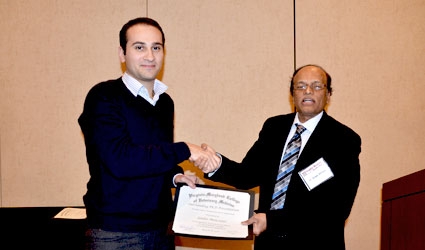
Giulio Menciotti of Terni, Italy, who earned his DVM from the Università degli Studi di Padova, also received the Outstanding Ph.D. Presentation Award. Menciotti uses advanced 3D imaging to examine dog heart valves alongside Michele Borgarelli, associate professor of cardiology in the Department of Small Animal Clinical Sciences. “My Ph.D. studies focus on the most common cardiac disease of small breed dogs, which is also the most common cause of heart failure in this species. Although very common, the cause of the disease is still unknown. The results of my research could improve our understanding of the disease, and hopefully advance our ability to diagnose and treat this condition. Nonetheless, humans can be affected by a very similar condition, and dogs can represent a natural model for this disease,” Menciotti explained.
Menciotti also received second prize in the Young Investigator Research Communication category by the European Society of Veterinary Cardiology for his oral presentation at the European College of Veterinary Internal Medicine - Companion Animals and was award first place twice and second place once for the Clinical Research Poster - Student category at the Via Research Days organized by the Virginia College of Osteopathic Medicine. “Doing a Ph.D. requires strong motivation. Luckily, I have to admit that I never lacked incentives. The challenges encountered along the path represent to me a strong push towards the biggest scope of improving animal and human health,” said Menciotti.
Zoetis Award for Veterinary Research Excellence
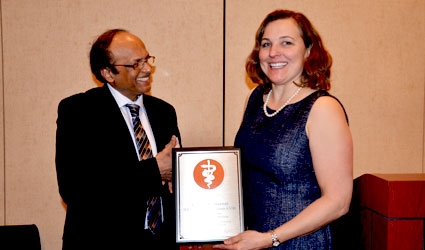
Jennifer Barrett, the Theodora Ayer Randolph professor of equine surgery in the Department of Large Animal Sciences, won the Zoetis Award for Veterinary Research Excellence. Barrett, who joined the faculty at the Marion duPont Scott Equine Medical Center (EMC) in 2007, focuses her research on regenerative medicine and its applications on the equine athlete. A founding director of the North American Veterinary Regenerative Medicine Association, Barrett established the Regenerative Medicine Service at the EMC, which offers stem cell treatment and platelet rich plasma therapy to patients in Leesburg and beyond.
“Dr. Barrett is very active in the provision of clinical service at the EMC, and in that role is able to ensure that her research is informed by, and has application to, the actual clinical problems encountered in the equine athlete,” said Harold McKenzie, associate professor of large animal medicine, in his nomination letter. “In addition to these efforts Jennifer has developed extensive collaborations, both here in Blacksburg, but also with researchers at other institutions including Johns Hopkins University, George Mason University, and Wake Forest University, as well as specialists in private veterinary medicine.”
The Zoetis award is a nationally recognized honor for a faculty member at each veterinary school in the United States. The award seeks to “foster innovative research, on which the scientific advancement of the profession depends, by recognizing outstanding research effort and productivity.”
Outstanding Co-Worker Recognition Award
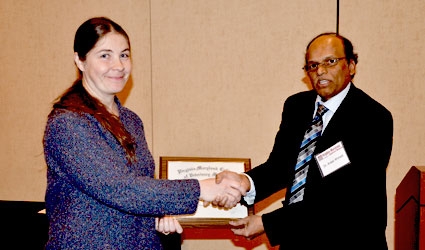
Lynn Heffron, senior lab specialist in University Distinguished Professor X.J. Meng’s laboratory, received the Outstanding Co-Worker Recognition Award. Heffron joined the Meng laboratory in November 2012 and currently manages day-to-day operations and ensures the lab runs smoothly. She works with a team of doctorate students, post-doctoral associates, and research scientists, and is regarded as a team player in all aspects of her job. Heffron was recognized for her professionalism, work ethic, and willingness to assist others.
Written by Kelsey Foster, a master’s degree student in the Department of Communication in the College of Liberal Arts and Human Sciences.


